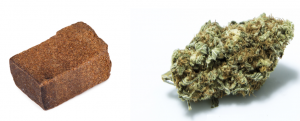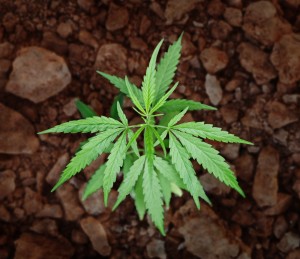
Smoking higher-potency cannabis may be a considerable risk factor for psychosis according to research conducted in South London (Di Forti, et al., 2015).
Cannabis is the most widely used illicit drug in the UK and previous research has suggested an association between use of the drug and psychosis, however the causal direction and underlying mechanism of this association are still unclear.
This recent case-control study published in Lancet Psychiatry, aimed to explore the link between higher THC (tetrahydrocannabinol) content and first episode psychosis in the community.
To compare the impact of THC content on first episode psychosis, participants were asked whether they mainly consumed skunk or hash. Analysis of seized cannabis suggests that skunk has THC content of between 12-16%, while hash has a much lower THC content ranging from 3-5% (Potter, Clark, & Brown, 2008; King & Hardwick, 2008).

Cannabis hash and skunk have very different quantities of the active THC component. Government figures suggest 5% in hash and 15% in skunk.
Methods
The researchers used a cross-sectional case-control design. Patients presenting for first-episode psychosis were recruited from a clinic in the South London and Maudsley NHS Foundation Trust; patients who had an identifiable medical reason for the psychosis diagnosis were excluded. Control participants were recruited from the local area using leaflets, internet and newspaper adverts. There were 410 case-patients and 370 controls recruited.
Researchers gathered data on participants’ cannabis use in terms of lifetime history and frequency of use as well as type of cannabis used, i.e. skunk or hash. Participants were also asked about their use of other drugs including alcohol and tobacco, as well as providing demographic information.
Results
The case-patients and control participants were different in a couple of key areas (note: psychosis is more common in men and in ethnic minorities):
| Case patients | Control participants | |
| Male | 66% | 56% |
| Age | 27.1 years | 30.0 years |
| Caribbean or African ethnic origin | 57% | 30% |
| Completed high level of education | 57% | 90% |
| Ever been employed | 88% | 95% |
| Lifetime history of ever using cannabis | 67% | 63% |
Participants with first episode psychosis were more likely to:
- Use cannabis every day
- Use high-potency cannabis
- Have started using cannabis at 15 years or younger
- Use skunk every day
A logistic regression adjusted for age, gender, ethnic origin, number of cigarettes smoked, alcohol units, and lifetime use of illicit drugs, education and employment history showed that compared to participants who had never used cannabis:
- Participants who had ever used cannabis were not at increased risk of psychosis
- Participants who had used cannabis at age 15 were at moderately increased risk of psychotic disorder
- People who used cannabis or skunk everyday were roughly 3 times more likely to have diagnosis of psychotic disorder
A second logistic regression was carried out to explore the effects of a composite measure of cannabis exposure which combined data on the frequency of use and the type of cannabis used. Compared with participants who had never used cannabis:
- Individuals who mostly used hash (occasionally, weekends or daily) did not have any increased risk of psychosis
- Individuals who smoked skunk less than once a week were nearly twice as likely to be diagnosed with psychosis
- Individuals who smoked skunk at weekends were nearly three times as likely to be diagnosed with psychosis
- Individuals who smoked skunk daily were more than five times as likely to be diagnosed with psychosis
The population attributable factor (PAF) was calculated to estimate the proportion of disorder that would be prevented if the exposure were removed:
- 19.3% of psychotic disorders attributable to daily cannabis use
- 24.0% of psychotic disorders attributable to high potency cannabis use
- 16.0% of psychotic disorders attributable to skunk use every day

These findings support efforts to raise awareness among young people of the risks associated with the use of high-potency cannabis.
Conclusions
The results of this study support the theory that higher THC content is linked with a greater risk of psychosis, with daily use of skunk conferring the highest risk. Recruiting control participants from the same area as the case participants meant that the two groups were more likely to be matched on not only demographic factors but also in terms of the actual cannabis that both groups were consuming.
The study has some limits, such as the cross-sectional design which cannot be used to establish causality. Also the authors have not included any comparison between those who smoke hash and those who consume skunk so no conclusions can be drawn about the relative harm of hash.
Media reports about the study have mainly focussed on the finding that ‘24% of psychotic disorders are attributable to high potency cannabis use’. This figure was derived from a PAF calculation which assumes causality and does not allow for the inclusion of multiple, potentially interacting, risk factors. Crucially the PAF depends on both the prevalence of the risk factor and the odds ratio for the exposure; the PAF can be incredibly high if the risk factor is common in a given population.
In this case, the prevalence rate of lifetime cannabis use was over 60% in both participant groups. According to EMCDDA, the lifetime prevalence of cannabis use in the UK is 30% among adults aged 15-64, so it is arguable that this study sample is not representative of the rest of the UK. The authors themselves note that “the ready availability of high potency cannabis in south London might have resulted in a greater proportion of first onset psychosis cases being attributed to cannabis use than in previous studies”, which is a more accurate interpretation than media reports claiming that “1 in 4 of all new serious mental disorders” is attributable to skunk use.
Future studies looking at the relationship between cannabis and psychosis should also aim to differentiate high and low potency cannabis. Longitudinal cohort studies are particularly useful as they have the same advantages as a case-control design but data about substance use could be more reliable as ‘lifetime use’ can be gathered from multiple measurements collected at a number of time points across the lifetime.

The innovative psychosis research conducted by this group led by Prof Robin Murray, is the first to distinguish between different potencies of cannabis in this way.
Links
Primary study
Di Forti M. et al (2015). Proportion of patients in south London with first-episode psychosis attributable to use of high potency cannabis: a case-control study (PDF). The Lancet Psychiatry, 2(3), 233-238.
Other references
King L, & Hardwick S. (2008). Home Office Cannabis Potency Study (PDF). Home Office Scientific Development Branch.
Potter DJ, Clark P, & Brown MB. (2008). Potency of Delta(9)-THC and other cannabinoids in cannabis in England in 2005: Implications for psychoactivity and pharmacology (PDF). Journal of Forensic Sciences, 53(1), 90-94.

RT @Mental_Elf: High potency cannabis and the risk of psychosis http://t.co/4gbvVyGPm8
High potency cannabis and the risk of psychosis http://t.co/G9facEjumI #MentalHealth http://t.co/os6rGWGhYB
High potency cannabis and the risk of psychosis: Eleanor Kennedy writes her debut blog on a recent case-contro… http://t.co/yn0eCyerX0
Olivia Cialdi liked this on Facebook.
Angie Lock liked this on Facebook.
We welcome another @BristolTARG blogger today. It’s @Nelllor_ discussing high potency #cannabis & risk of #psychosis http://t.co/4gbvVypeuA
Fellow @BristolTARG PhD student @Nelllor_ blogs about high potency cannabis and psychosis on @Mental_Elf: http://t.co/hrYrbLjRdC
“High potency cannabis increases the risk of psychosis” #TalkMental @StPatricks for #Recovery http://t.co/SjpPDYRpWR
High potency #cannabis & the risk of #psychosis http://t.co/ziWsZTxVSN #casecontrolstudy review from @Mental_Elf #evidence #mentalhealth
Stronger #cannabis is more of a risk factor for #psychosis, says recent South London study http://t.co/4gbvVypeuA #skunk
RT @Mental_Elf: .@TheLancetPsych study highlights #MentalHealth risks associated with use of high-potency cannabis http://t.co/4gbvVypeuA #…
RT @TrainInnovate: High potency cannabis and the risk of #psychosis via @Mental_Elf http://t.co/HjjrV2zWZ5 #BiziTalk #PurpleBiz #Mentalheal…
High potency #cannabis and the risk of #psychosis. #lareponsedupsy http://t.co/nYP8LVUuKB
Can smoking skunk lead to severe mental health problems? We summarise the latest research http://t.co/4gbvVypeuA http://t.co/lPWVrguU2E
@Mental_Elf A bit disappointed that the picture used to accompany the article perpetuates the same old racial stereotypes….sigh…
Useful summary on the potential mental health effects of cannabis http://t.co/ilv0YKbjS5 via @Mental_Elf
@Mental_Elf and are services able to cope with increasing numbers seeking treatment ? – http://t.co/u3aweWj4tL
@Mental_Elf Hopefully, the weed apologists won’t see this as another govt inspired conspiracy. Not holding my breath though……
Ett frekvent rökande av hasch eller skunk ökar risken för psykos enligt ny studie. http://t.co/4JtmeAOBDA
Can smoking skunk lead to severe mental health problems? http://t.co/4p6j9zHhZx http://t.co/XYr2VDpk32” @hannah_yb for your intro maybe?
Don’t miss: High potency cannabis and the risk of psychosis http://t.co/4gbvVypeuA #EBP
This is shit. Do all cannabis consumers have mental health problems ? Certainly not. So you can not say that cannabis create psychosis. Finally, what does “psychosis” mean ? I think you should study more about the definition of psychosis and not about trying to know if cannabis is good or not. Cannabis has always existed since beginning of humanity and there is no testimony in world history that cannabis is a bad substance. Cannabis is not bad at all. It is a wonderful plant and substance. The problem is that we live in a very stressing world, in a society that produce anxiety more than ever. Also the problem is that some people don’t know how to produce good cannabis. Why scientists do watch consequences instead watching the causes ? I have just read today that some reasons why some people have psychosis is trauma and psychologic problems in their life. This research is shit.
RT @Mental_Elf: Future studies of relationship between cannabis & psychosis should aim to differentiate high & low potency cannabis http://…
Let’s talk about cannabis. A neat little study on FEP and THC http://t.co/VS1OA08YZb
“High potency cannabis and the risk of psychosis” http://t.co/7kRlsB8LhE
より高濃度のTHCと若年からの使用が精神病の危険性を高めるとの報告です。
High potency cannabis and the risk of psychosis http://t.co/EgWzrSDEjT @sharethisさんから
‘High potency cannabis and the risk of psychosis’ – read the latest blog from @Mental_Elf http://t.co/g3fKr98aob http://t.co/bYPWKm9xAk
Yet more media attention regarding #cannabis and mental health! http://t.co/ISppj6OQ9R Check our blog on the issue
http://t.co/ISppj6OQ9R
Mosaic Training Consultancy Ltd liked this on Facebook.
Hoog potent cannabis en risico op psychose via @Mental_Elf http://t.co/TqA1YObzKD #yam
MT @Mental_Elf: Smoking skunk lead to severe mental health problems? Summary latest research http://t.co/yniyZUh3fr http://t.co/zY8wtcztXD
@NORMLUK @Mental_Elf This is like saying chemo causes cancer based on the number of people having chemo for cancer. This is not science!
High potency cannabis and the risk of psychosis http://t.co/160utODMF6 via @sharethis
RT @Mental_Elf: Government figures suggest that #Cannabis hash is 5% THC (tetrahydrocannabinol), whereas skunk is 15% THC http://t.co/4gbvV…
[…] E. (2015) High potency cannabis and the risk of psychosis. The Mental Elf, 24 Mar […]
[…] The authors also calculated the population attributable fractions (PAF) for each outcome, this has been discussed in a previous blog. […]
[…] Kennedy E. (2015) High potency cannabis and the risk of psychosis. The Mental Elf, March 24 2015. https://www.nationalelfservice.net/mental-health/substance-misuse/high-potency-cannabis-and-the-risk… […]
[…] High potency cannabis and the risk of psychosis […]